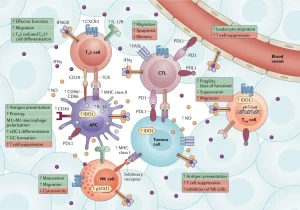
Surgery
Surgical treatment aims to remove cancerous tumors or affected tissues. While often essential for cancer management, surgery can have both immediate and long-term effects on the body.
- Physical Impact:
- Postoperative pain is a common outcome, often managed with medication and physical therapy.
- Fatigue and limited mobility may occur, especially if surgery involves major organs or the musculoskeletal system.
- In cases where significant tissue is removed (e.g., a mastectomy for breast cancer), reconstructive surgery or prosthetics may be required to restore function or appearance.
- Risks of Infection and Healing Challenges:
- Surgical wounds may become infected, prolonging recovery time.
- Healing can be slower in individuals with compromised immune systems or pre-existing conditions such as diabetes.
- Psychological Impact:
- Changes in body image can affect self-esteem and mental health.
- Coping with the emotional strain of a major procedure may lead to anxiety or depression.
Chemotherapy
Chemotherapy uses drugs to target and kill rapidly dividing cancer cells. However, because these drugs also affect healthy cells, chemotherapy can lead to various side effects.
- Immediate Effects:
- Nausea and Vomiting: Chemotherapy irritates the stomach lining and stimulates the brain’s nausea center.
- Hair Loss (Alopecia): Hair follicles, which are rapidly dividing cells, are highly susceptible to damage.
- Fatigue: This can result from anemia, disrupted sleep patterns, or the body’s effort to repair damage caused by the treatment.
- Immune Suppression:
- Chemotherapy suppresses bone marrow activity, reducing the production of white blood cells. This increases the risk of infections and can make minor illnesses more severe.
- Long-term Impacts:
- Peripheral neuropathy, characterized by tingling, pain, or numbness in extremities, may persist even after treatment ends.
- Cognitive effects, often called “chemo brain,” include difficulties with memory, attention, and executive functions.
Radiation Therapy
Radiation therapy uses high-energy beams to destroy cancer cells. While precise and localized, it can still harm nearby healthy tissues.
- Skin Changes:
- The skin in the treated area may become red, dry, and itchy, similar to a sunburn. In some cases, it can develop blisters or peel.
- Over time, skin may lose elasticity, leading to permanent texture changes.
- Localized Effects:
- Head and Neck Cancer: Radiation can lead to dry mouth, difficulty swallowing, or loss of taste.
- Pelvic Cancer: Patients may experience bowel and bladder irritation, manifesting as diarrhea, cramping, or frequent urination.
- Fatigue and Organ-Specific Damage:
- General fatigue is common due to the body’s repair efforts.
- Long-term use can lead to fibrosis (scarring of tissues), reducing the functionality of organs like the lungs or heart.
Immunotherapy
Immunotherapy boosts or modifies the immune system to recognize and attack cancer cells. While promising, this treatment comes with unique challenges.
- Inflammatory Responses:
- Flu-like symptoms, including fever, chills, and muscle aches, are common as the immune system becomes hyperactive.
- Inflammation in various body parts, such as the lungs (pneumonitis) or liver (hepatitis), can occur.
- Autoimmune-Like Reactions:
- Immunotherapy may cause the immune system to attack healthy tissues, leading to thyroid dysfunction, joint pain, or skin rashes.
- Long-Term Benefits and Challenges:
- Unlike chemotherapy, the effects of immunotherapy may last longer, offering a prolonged immune response against cancer.
- However, managing chronic inflammation or immune-related side effects can be challenging.
Targeted Therapy
Targeted therapy focuses on specific molecules or pathways involved in cancer growth, often leading to fewer side effects compared to traditional treatments. However, it can still affect the body in significant ways.
- Skin and Hair Changes:
- Targeted drugs can cause rashes, dry skin, or changes in hair color or texture.
- Heart and Liver Toxicity:
- Some targeted therapies may affect heart function or cause liver inflammation, necessitating regular monitoring.
- Diarrhea and Gastrointestinal Symptoms:
- These are common due to the impact of targeted drugs on healthy cells in the gastrointestinal tract.
Emotional and Psychological Effects
Cancer treatment impacts more than just physical health. Emotional and mental health challenges often accompany the process.
- Anxiety and Depression:
- Uncertainty about treatment outcomes, side effects, and fear of recurrence contribute to mental health struggles.
- Hormonal therapies, particularly in breast or prostate cancer, can exacerbate mood swings or depressive symptoms.
- Cognitive Effects:
- Memory and concentration issues, often called “chemo fog,” are linked to both chemotherapy and the psychological toll of cancer.
- Social Isolation and Relationship Strain:
- Treatment schedules, physical limitations, and body image concerns can lead to isolation or difficulties in personal relationships.
Lifestyle and Recovery
The impact of cancer treatment often necessitates significant lifestyle changes.
- Dietary Adjustments:
- Nutritional needs may change to counteract treatment side effects like weight loss, malnutrition, or digestive issues.
- Exercise and Physical Therapy:
- Regular physical activity can alleviate fatigue, improve mood, and promote overall recovery, though the intensity should be tailored to individual capabilities.
- Long-Term Monitoring:
- Survivors require regular check-ups to detect any recurrence or manage lingering side effects.
Hope and Resilience
Despite these challenges, many individuals experience remarkable recovery and resilience. Advances in supportive care, including pain management, psychological counseling, and holistic therapies, help mitigate side effects and improve quality of life.
Conclusion
Cancer treatment is a multifaceted journey that affects the body and mind in profound ways. While the immediate and long-term effects can be daunting, understanding these impacts helps patients and their families prepare for and cope with the challenges ahead. With ongoing research and personalized care, many of these effects can be managed effectively, allowing individuals to live fulfilling lives after treatment.
